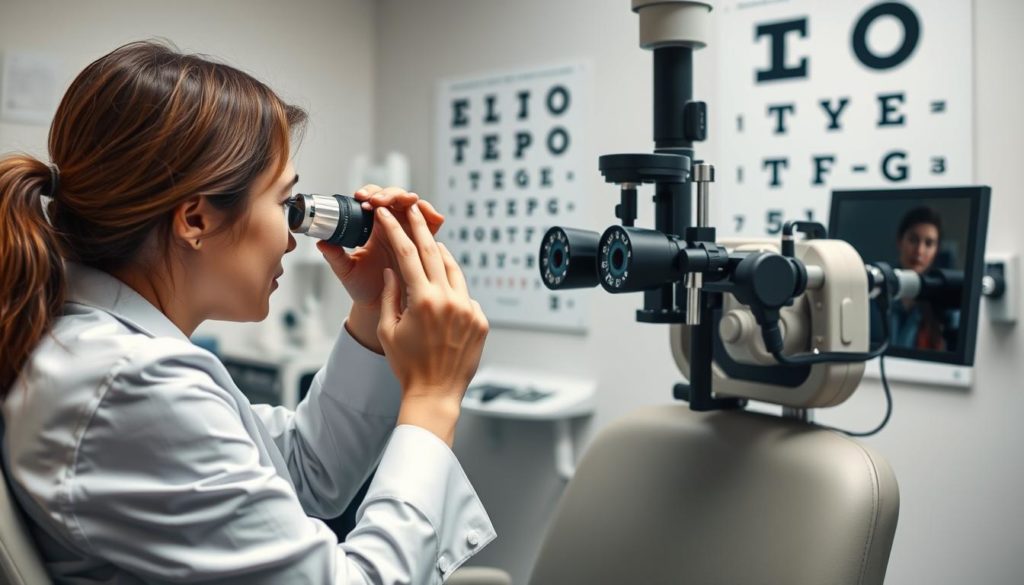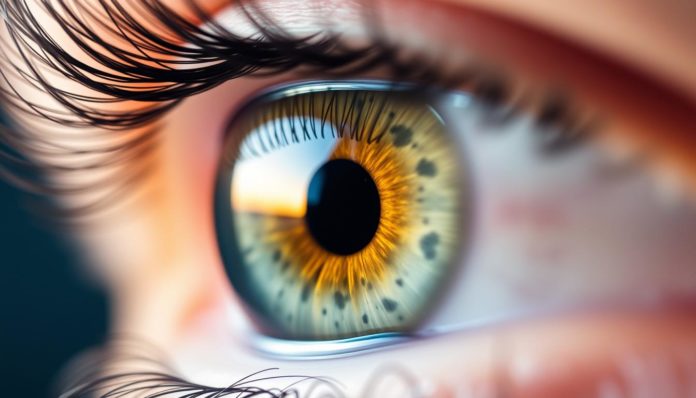Did you know around 75% of adults need vision correction? This fact shows how important good eyesight is. Being able to see well is key for enjoying life to the fullest. As we get older, usually after 40, our eyes start to change. We might need more light to read or find it hard to see when driving at night.
Getting your eyes checked regularly is crucial. It helps find eye problems early, so you can keep seeing well. Living a healthy lifestyle helps too. Things like wearing sunglasses, eating right, and staying active keep your eyes sharp. Dr. Sebastian Heersink, a top eye doctor, says eating well, exercising, and not smoking are important for eye health.
There are also medical ways to help your eyes, like LASIK surgery or taking care of diabetes. Taking care of your eyes means not just seeing better now. It means having a better life for years to come.
The Importance of Regular Eye Exams
Getting your eyes checked regularly is very important for your vision and eye health. These exams check your eyesight and can find eye problems early on.

What to Expect During an Eye Exam
At an eye exam, your eye doctor will test how well you see. They check how your eyes work together and move. You might get eye drops to let the doctor see inside your eye better.
This dilated eye exam can find hidden eye health issues.
Recommended Frequency for Eye Check-ups
The National Institute on Aging suggests getting eye exams every one to two years. This depends on your age, family history of eye disease, and other health problems. Going to the eye doctor regularly helps keep an eye on your eye health.
| Age Group | Frequency of Eye Exam |
|---|---|
| 0-5 years | At least once a year |
| 6-18 years | Every 2 years |
| 19-60 years | Every 1-2 years |
| 61+ years | Annually |
Detecting Eye Problems Early
Finding eye problems early is key to treating them well. Glaucoma, macular degeneration, and diabetic retinopathy often start without symptoms. By having regular eye exams, you can catch and treat these problems early.
Proper Nutrition for Better Eyesight
Taking care of your eyes for the long run starts with what you eat. A healthy diet full of important vitamins and minerals can really help your eyes. This part talks about the best nutrients for your eyes, the foods you should eat more of, and how dietary supplements might help.

Key Nutrients for Eye Health
Some nutrients are really good for your eye health. Carotenoids like lutein and zeaxanthin shield your eyes from bad blue light. Vitamins for eyes such as A, C, and E fight against cell damage in your eyes. Plus, zinc keeps your retina healthy.
Foods to Include in Your Diet
Eating the right foods is key. Spinach and kale are great because they’re packed with carotenoids. Oranges and grapefruits give you lots of Vitamin C. Eggs give you Vitamin A and zinc, which are both good for your eyes. And eating fish like salmon and tuna gives you omega-3s, helping avoid eye problems as you age.
The Role of Supplements
Sometimes food alone isn’t enough. Then, dietary supplements come in handy. Studies show that taking supplements with vitamins A, C, E, carotenoids, and zinc helps with eye health. Even fortified cereals and multivitamins can up your nutrient intake every day.
| Key Nutrient | Sources | Benefits |
|---|---|---|
| Vitamins for Eyes (A, C, E) | Citrus fruits, leafy greens, eggs, fish oils | Reduce oxidative stress |
| Carotenoids (Lutein, Zeaxanthin) | Spinach, kale, corn, eggs | Protect against blue light |
| Zinc | Fortified cereals, red meat, shellfish | Support retina health |
How Physical Activity Can Improve Visual Acuity
Regular physical activity helps improve your eye health a lot. Let’s explore scientific studies that show how exercise helps your eyes. It explains the exercise benefits for better visual sharpness and lowers glaucoma risks.
Studies Linking Exercise and Eye Health
Many studies show a link between steady exercise and better eye health. Besides keeping your heart healthy, exercise cuts the glaucoma risk by 50%. This shows how keeping fit helps not just your muscles and heart, but your eyes too.
Recommended Physical Activities
To make the most of exercise for your eyes, it’s important to do different activities. Here are some of the best ones:
- Brisk Walking: It’s an easy way to increase your heart rate, helping your heart and eyes.
- Swimming: A gentle workout that improves lung health and blood flow.
- Cycling: This active exercise boosts your fitness and helps lower glaucoma risk.
Adding these exercises to your routine improves your overall health. They’re key for keeping your eyes healthy and preventing serious eye issues.
Understanding Visual Acuity Tests
Visual acuity tests check how clear your vision is. They often use the Snellen Chart. This chart is key to figuring out how well you see from a certain distance.
The Snellen Chart Explained
The Snellen Chart helps test how sharp your vision is. You read letters from 20 feet away. The chart has letters that get smaller and checking if you can see them shows how sharp your eyes are. This test is crucial for finding out if you have nearsightedness or farsightedness.
Interpreting 20/20 Vision
Having 20/20 vision from an eye test is great. It means you see clearly at 20 feet what should be seen at that range. This level is the goal for excellent vision. If you’re not at this standard, you might need help to see better.
When Vision Correction is Needed
If your test says your vision isn’t 20/20, you may need help. This could be glasses, contacts, or surgery. Issues like nearsightedness and farsightedness affect your life. So, fixing your sight helps you enjoy life more.
Role of Corrective Lenses in Enhancing Vision
Corrective lenses help with different eye problems, like nearsightedness and farsightedness. They adjust light focus on the retina. This improves how well you can see. After a vision test, you get a prescription that instantly betters your sight. It’s important to see an ophthalmologist to find the best solution for your vision.
The table below gives a side-by-side look at eyeglasses and contact lenses:
| Feature | Eyeglasses | Contact Lenses |
|---|---|---|
| Comfort Level | Stable on face, no eye contact | Direct eye contact, may cause discomfort |
| Maintenance | Requires regular cleaning | Needs cleaning and proper storage |
| Visual Field | Limited by frames | Full range of vision |
| Durability | Long-lasting, less prone to contamination | Disposable, frequent replacements needed |
| Customization | Limited designs | Available in various types and colors |
Both eyeglasses and contact lenses correct vision well. You can choose what fits your life and comfort best. But remember, always visit an ophthalmologist. They make sure your eyes stay healthy and your vision correction is up to date.
Eye Protection from UV Radiation
It’s vital to ensure eye protection from ultraviolet (UV) radiation to keep your vision safe. UV light can cause serious eye problems, like cataracts and macular degeneration. Knowing how to protect your eyes is key.
Importance of UV Protection
UV rays are a major danger not only to your skin but to your eyes as well. Wearing sunglasses with UV filters and a wide-brimmed hat is essential. This is because UVA and UVB rays can get through clouds, making it necessary to protect your eyes all year.
Good UV protection keeps your eyes healthy and prevents diseases like macular degeneration.
Choosing the Right Sunglasses
Pick sunglasses that block 99-100% of UVA and UVB rays. Go for wrap-around sunglasses for better protection. While polarized lenses are great for reducing glare, they must also block UV rays.
Additional Tips for Eye Safety
Along with the right sunglasses, other habits are important for eye safety. Stay out of the sun from 10 AM to 4 PM when UV rays are strongest. Never stare at the sun, as it can hurt your eyes, even during an eclipse.
- Wear a broad-brimmed hat for added protection.
- Seek shade whenever possible.
- Avoid tanning beds, as they can also emit UV radiation.
| Eye Condition | Cause | Prevention Tips |
|---|---|---|
| Macular Degeneration | Prolonged UV exposure | Wear sunglasses with UV protection |
| Cataracts | Accumulated UV damage | Consistent use of UV-filtering sunglasses |
| Eye Cancer | Excessive UV radiation | Combine sunglasses with a hat for full coverage |
What is LASIK and How it Helps
LASIK, or laser-assisted in situ keratomileusis, is a type of eye surgery. It corrects vision problems like nearsightedness, farsightedness, and astigmatism by reshaping the cornea. This procedure can greatly improve or even remove the need for glasses or contacts.
Many people see major improvements in their vision after LASIK. They enjoy clear vision and freedom from glasses or contacts. For more details on LASIK’s benefits, click here.
Suitability Criteria for LASIK
To get the best results, it’s important to know if you’re a good candidate for LASIK. Generally, you should be 18 or older with stable vision for a year. A detailed eye exam is necessary to see if LASIK is a good option for you.
- Age: Minimum 18 years
- Stable vision for at least one year
- Healthy eye tissues, free from conditions like cataracts or glaucoma
The Procedure and Recovery
The LASIK procedure starts with making a thin flap in the cornea. Then, a laser reshapes the cornea to fix vision errors. Most people notice clearer vision within 24 hours after surgery.
- Initial consultation and evaluation
- Corneal flap creation
- Laser reshaping of the cornea
- Flap repositioning and postoperative care
After surgery, you must use eye drops to prevent infection and reduce swelling. It’s also important to avoid hard activities and protect your eyes while healing.
Pitfalls to Consider
LASIK has many benefits, but it’s not right for everyone. Issues like other eye conditions, not having realistic expectations, or vision that changes often can affect if you can have LASIK. It’s key to talk about these risks with an eye doctor before deciding on surgery.
“LASIK is a big step in eye surgery, but it needs careful thought and talking with experts.”
Knowing all about LASIK, the requirements, and recovery helps you make a smart choice. Learn how LASIK can change the way you see here.
Managing Eye Health with Diabetes
Diabetes can greatly affect your life, including your eyes. Keeping your eyes healthy is key for people with diabetes. This helps prevent serious eye problems.
Impact of Diabetes on Vision
Diabetes can cause eye issues such as diabetic retinopathy, cataracts, and glaucoma. Diabetic retinopathy happens when high sugar levels harm the retina’s blood vessels. The control of blood sugar levels and how long you have had diabetes affect this risk.
Regular check-ups and managing your blood sugar can lower these dangers.
Strategies for Managing Diabetic Eye Disease
To manage diabetic eye diseases, you need to be active in your care. Regular eye check-ups help find potential problems early. A healthy diet, exercise, and taking medications as directed keep your vision stable.
It’s also critical to work on stopping diabetic retinopathy from getting worse. Keeping your vision stable does not mean your eyes are improving. It means the disease is not progressing.
FAQ
What to Expect During an Eye Exam
In an eye exam, the optometrist checks your visual sharpness, depth perception, alignment, and movement. They might use dilating drops to see inside your eye for any health signs.
How Often Should I Get My Eyes Checked?
You should have an eye exam every one to two years. This is recommended by the National Institute for Aging. It’s especially important if you have a family history of eye issues, diabetes, or high blood pressure.
What are the Benefits of Detecting Eye Problems Early?
Finding eye problems early lets doctors treat them right away. This way, treatment works better and can stop vision loss or serious problems. Regular eye checks help catch issues early on.
What Nutrients are Important for Eye Health?
Eyes need carotenoids, zinc, and vitamins C and E to stay healthy. These nutrients help avoid eye diseases as you get older and keep your eyes in good shape.
Which Foods Should I Include in My Diet for Better Eyesight?
Eat fruits, leafy greens, and fish that’s high in omega-3 fats for your eyes. Oranges, broccoli, eggs, and fortified cereals are great choices, too.
Should I Consider Taking Supplements for Eye Health?
Supplements may help if your diet’s missing important eye nutrients. Vitamins A, C, and E can lower stress on your eyes. But, talk to a doctor before starting supplements.
How Does Physical Activity Affect Eye Health?
Staying active helps your eyes stay healthy. It can cut your glaucoma risk by 50%. Plus, exercising helps your heart, which also lowers your glaucoma risk.
What Types of Exercise are Best for Eye Health?
Go for walks, swim, or cycle to help your heart and eyes. Try to be active for at least 150 minutes every week.
How is Visual Acuity Measured?
Doctors use a Snellen Chart to check how sharp your vision is. This test, done from 20 feet away, helps see if you need vision correction.
What Does 20/20 Vision Mean?
If you have 20/20 vision, you see what most people can from 20 feet away. If you see worse than 20/20, you might need glasses or other help.
When Should I Consider Vision Correction?
Consider vision correction if tests show your sight is below 20/20 and it’s tough to do daily tasks. Glasses, contacts, or surgery could help.
How Do Corrective Lenses Improve Vision?
Corrective lenses help focus light right on your retina, making your vision clearer. Your prescription is based on tests from an eye doctor.
Why is UV Protection Important for Eye Health?
UV rays can cause cataracts, macular degeneration, and even eye cancer. Wear UV-blocking sunglasses and a hat to protect your eyes from the sun.
How to Choose the Right Sunglasses for UV Protection?
Pick sunglasses that block almost all UVA and UVB rays. Make sure they fit well and cover your eyes completely.
What Additional Tips Can Help Keep My Eyes Safe?
Stay out of strong sunlight when UV rays are highest. Don’t look straight at the sun, and wear safety glasses for risky activities.
What is LASIK Surgery?
LASIK surgery fixes vision problems like nearsightedness, farsightedness, and astigmatism. It changes the shape of your cornea and can greatly improve your sight.
Who is a Suitable Candidate for LASIK?
You can consider LASIK if you’re over 18, your vision has been stable for a year, and your eyes are healthy. Always discuss risks with an eye expert first.
What Should I Expect During the LASIK Procedure and Recovery?
LASIK is quick and doesn’t hurt much. Your vision usually gets better soon after. It’s important to follow your doctor’s care instructions for the best recovery.
How Does Diabetes Affect Eye Health?
Diabetes can make you get diabetic retinopathy, cataracts, and glaucoma. It’s key to manage your sugar, blood pressure, and cholesterol to prevent or slow down these eye diseases.
What Strategies Can Help Manage Diabetic Eye Disease?
To manage diabetic eye disease, get regular eye checks, control your blood sugar, and take care of your diabetes. Catching and managing eye problems early is very important.


